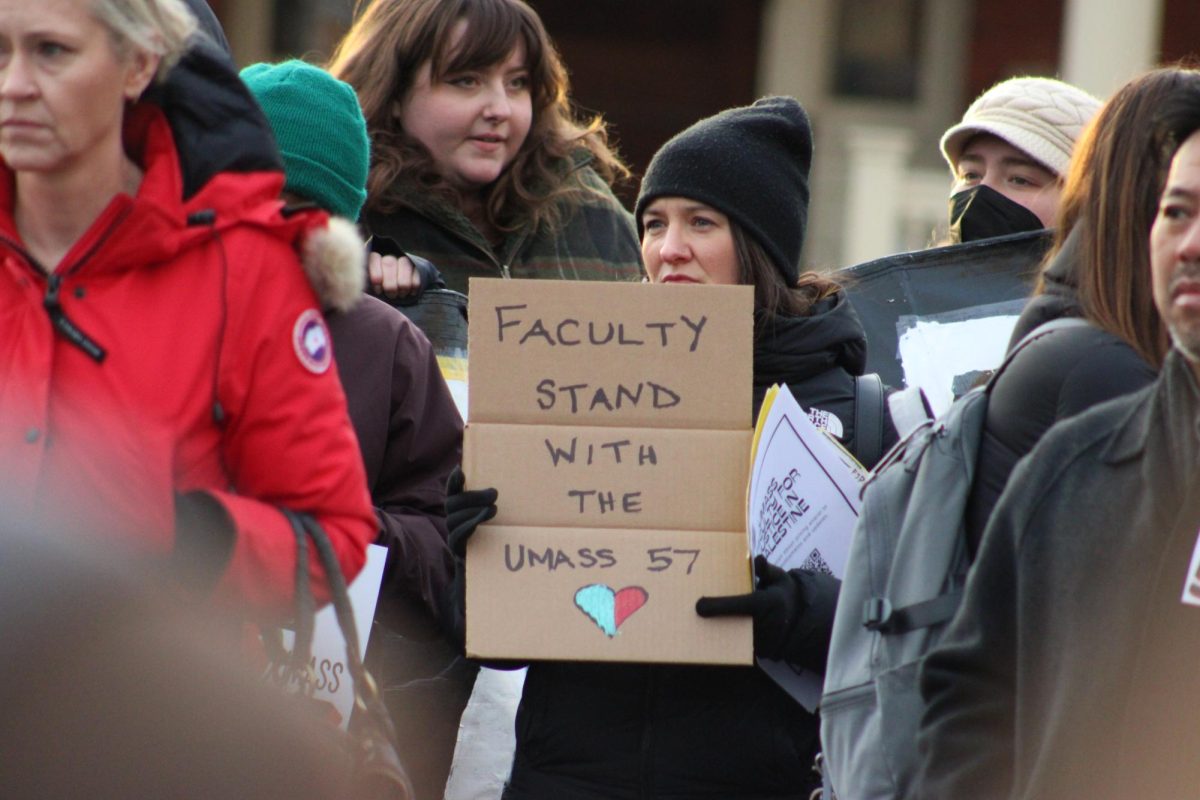
Dear Editor,
I am a first year college student at UMass. I, along with many other college freshmen, feel more stressed than ever this year. Collegian writer Nancy Pierce’s [reporting] is correct in her Feb. 6 article “College freshmen more stressed than ever.” Students want their college experience to be significant, successful and satisfying. Coming to college, I knew it was going to be tough. The work is overwhelming, and I feel the need to do well in order to fulfill my parents’ investment in my college career. I think it is safe to say I feel more stressed with school than I ever had before.
The New York Times article, “Record Level of Stress Found in College Freshmen” on freshman stress levels is similar as well. This article talks a lot about the economic difficulties with students and their families. The article mentions the recession, and points out that the economy has only added onto the stress of students.
The Chicago Tribune also had an article on the topic, “Small Talk: Are college freshmen more stressed than ever?” They noted a survey that found that among the 200,000 freshmen asked, only 52 perecent said their emotional health was above average, which is the lowest percent since 1985. Stress levels for college freshmen need to be lowered.
Sincerely,
Ricky Belsky
UMass Student
Dear Editor,
I believe that the Faculty Senate’s plan to ban tobacco on campus is insane. Even though the Faculty Senate say that a healthy lifestyle and improving campus life as their motivation to implement the ban it seems that they have lost sight of those they are supposed to be looking out for. Although their intentions seem harmless, they are trying to keep students with stressful lives and workloads from indulging in a cigarette.
Students on campus are in fact adults and if their only way of relieving stress is a cigarette they should have the option to do that. UMass has long attempted to improve its partying image and the ban seems to be the next step in their quest to promote a safe campus. I think that they are using the health of the campus as a smoke screen so that they can advertise that their “smoke-free campus” as an attractive part of campus life.
Erin Lima-Kilgallon
UMass Student
Dear Editor,
After initially hearing about the smoking ban on campus I was intrigued. But upon further investigation, I feel that it’s not addressing the real issue at hand and that it’s infringing on students rights. With serious budget cuts coming in the next few years, the schools resources would be better used by offering counseling to those who want help, not by stripping liberties from students. It appears that the Faculty Senate is more interested “in making a statement than looking out for the students.”
The issue isn’t about second-hand smoke if they’re banning all tobacco products, which asks, “What are they trying to do?” I support a healthier campus, but it appears that the Senate doesn’t have the student body in mind. UMass Professor Tobias Baskin makes an analogy to the ban being similar to signs telling people to not throw away gum in water fountains. This is a poor comparison, as those who are throwing away gum in fountains are not addicted to this act. This course of action being taken by the Senate isn’t addressing the real issues and the school could allocate their resources more wisely by offering help to those in need.
Sincerely,
Alex Ball
UMass Student
Dear Editor,
On April 10, I read the article “Is a Snooki University Lecture Worth 32K,” and was utterly disgusted with the fact that Rutgers University spent $32,000 to have Snooki, from the Jersey Shore, as its guest speaker.
Not only is Snooki a terrible role model on National Television, but Rutgers paid her to talk about her partying, tanning and sex life. I don’t know about you, but I personally wouldn’t pay $32,000 to listen to someone tell me how to ruin my liver, get skin cancer and possibly catch a sexually transmitted disease.
Although Snooki is famous, and it would have been cool to meet her; it makes me wonder if Rutgers thought about what it could do with $32,000. Did they think about the people suffering from the tsunami in Japan or the earthquake in Haiti? The students could have at least paid for a more reputable speaker. Snooki’s advice that she gave to the students at this prestigious school was to, “study hard, but party harder.” It’s incredibly sad that Rutgers paid Snooki this large amount of money instead of putting it towards a better cause, or getting a more professional speaker.
Regards,
Stephanie Hill
UMass Student
Dear Editor,
As a freshman and a new member to the University of Massachusetts, I find that the new law on banning tobacco products on campus shouldn’t be allowed, and it is also a waste of time and effort. The majority of students are 18 years old by the time they’re in college, and no one should be allowed to tell them what to do since 18 is considered to be the age of a legal adult. Marijuana law calls for a fine if citizens are found with less than an ounce on them, but the University of Massachusetts wants to stoop so low as to ban even electronic cigarettes. How does that match up? Smoking weed and drinking alcohol is more likely to lead to other bad decisions and cause more harm than tobacco products. While under the influence of alcohol, a person’s judgment and inhibitions become impaired. People are more likely to crash a car, injure their self, or another person, and regret a decision they made while intoxicated. I’ve never heard of someone crashing a car because they were smoking a cigarette. Why ban something that’s not our biggest threat?
Sincerely,
Karleigh DiFranco
UMass Student
Dear Editor,
I believe that the tobacco ban on campus will ultimately be ineffective. Personally, I choose not to smoke, but I support every person’s right to do so. Many students smoke because they feel stressed out from their work and are looking for a release. What gives anybody the right to tell students they can’t smoke while they are trying to cram for a test or write a research paper? This ban would be similar to not allowing an adult to smoke at home or in their car.
As stated in William Perkins’ April 7 article, “UMass Faculty Senate Passes Campus Tobacco Ban,” the policy will be voluntary and not enforced by most cops. If the policy is not enforced by police on every occasion, the law will be ineffective because the punishment isn’t clear on smoking. In order to be effective, a ban would need to punish every violation. Since it is voluntary, people will push the envelope, which will result in the policy’s demise.
Sincerely,
David Westland
Amherst, Massachusetts
Dear Editor,
I am writing in response to an article written by Yaroslav Mikhaylov entitled “The Mullins Center Needs to Serve Alcohol” on April 4. Many parents come to games to support their children. Because alcohol is not allowed in the arena, attendees are forced to pregame before the big event if they want to get their buzz on.
In a 2007 survey done by ESPN, “Should Alcohol Be Allowed at Games,” many athletes felt that if a school is charging admission, alcohol should be served. It was unanimous that selling alcohol would boost the attendance to games. Student athlete Tyler Henley from the Rice baseball team in the survey said, “the alcohol policy for a sporting event should be left up to each school and its athletic department… ”
My last point is that the NCAA rules and regulations merely suggest that stadiums and arenas do not sell alcoholic beverages. So why does it seem that UMass is allowing students to pregame instead of allowing those who are legally of-age to drink at these sporting events? I will quote Mikhaylov when I propose, “how about installing a bar [at the Mullins Center] this summer?”
Sincerely,
Jeslyn Gordon
UMass Student
Dear Editor,
I found the article “Hip-Hop-ocrysy” by Lauren Vincent very offensive. The author defines “hip-hop” by two or three mainstream offensive “rappers,” and then goes on to claim that hip-hop is a destructive force for women’s rights. This simply gives a very inaccurate representation of what hip-hop is and may turn new listeners away for the wrong reasons. Clearly this writer has a limited understanding of hip-hop – which is an art form that encompasses not only vocal rapping, but also turntablism, break dancing and beatboxing (none of which could possibly be offensive towards a group). Even if one focuses only on the rapping portion of this diverse art form, it’s plain to see that the lyrics are purely about expression of the artist and not at all dictated by being loosely classified as hip-hop.
In addition, only a small portion of hip-hop focuses on such trivial subjects (alcohol, clubs, etc.). If anything, Vincent’s article should be about the problem with mainstream music artists objectifying and disgracing women. The real problem here is mainstream record companies (Sony, EMI, Universal). These companies consistently market and produce trashy, plain music with little or no thoughtful lyrics. They also put out music videos with scantily clad, skinny women with barely any clothes on. These videos easily reach the youth and cause the music of each successive generation to be ruled by these mock hip-hop artists. Luckily, with the advent of the Internet, smaller record companies and independent artists have a better opportunity at getting there music heard by a worldwide audience. Apparently though, some people still choose to let MTV and Top 40 dictate what music is “cool” and “good”.
My main point is: hip-hop does not implicitly involve offensive lyrics against women. And it’s offensive to say or imply that it does. Try reading up on the history of hip-hop or listening to any of the following artists to see how hip-hop is a type of music created to fight injustice, not support it.
Expand your musical horizons, and you won’t need to ignore the choruses to your favorite songs. Support Independent Music.
Julian Ross
UMass Student





